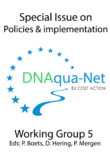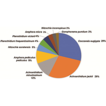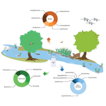In this collection

|
Papers published: 2 Documents added: 2 Printed version: Paperback Unique views: 6293 Total views: 10067 |
This DNAqua-Net topical issue edited by the leaders of Working Group 5 (Implementation and legal challenges) Pieter Boets (Belgium), Daniel Hering (Germany) and Patricia Mergen (Belgium) addresses chances and challenges of DNA based method implementation as part of legal bioassessment and monitoring programs. Defining standards for sampling, DNA analysis and bioinformatic processing of the data is crucial for implementation of DNA based biomonitoring with regard to the European Water Framework Directive, the Marine Strategy Framework Directive and many other international directives such as the US and AU Clean Water Act and many more. For the special issues, we welcome contributions that provide such guidelines for implementation or standardised methods that could help to legally accept the method. We further encourage forum papers that discuss changes and challenges of DNA-based bioassessment for biomonitoring of aquatic ecosystems for various perspectives or review papers that analyse the status quo of method implementation.


